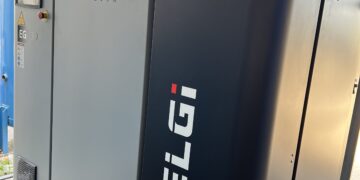Hardly any industrial company forgets regular service and maintenance measures for primary production machines. But what about industrial trucks, forklifts and lifting platforms? If these fail due to lack of maintenance, this has a major impact and, in the worst case, leads to a production stop. To ensure that they do not pose a danger, their safety must be checked at legally specified intervals. However, these appointments often get lost in the day-to-day business and are only attended to late or not at all. To prevent this from happening, it is best to work with professional maintenance management software (https://www.wartungsplaner.de).
Regardless of whether it’s a small family business with just one forklift or a large company with an entire fleet of vehicles — preventive maintenance brings great benefits. No one can afford to go without support for production and smooth operations. From the very first day of purchase, a plan for inspection and maintenance should be established and an appropriate service partner sought. Initial maintenance is usually performed by the manufacturer, but then the owner is responsible for operability and any defects.
Timely maintenance protects against consequential damage
Some companies feel that maintenance is a chore that disrupts the flow of operations and production, and only have the checks performed when repair is unavoidable. Often, however, the costs are so much higher. Firstly, because the breakdown of the forklift is not planned and so production has to be stopped abruptly. As a result, machines often come to a standstill and production figures cannot be achieved, which costs the company dearly. On the other hand, negligent maintenance also cannot prevent parts that are subject to heavy stress from breaking down and causing consequential damage to the industrial truck.
Therefore, it is better to carry out maintenance in good time with a suitable service partner. In this way, the service life of the forklift truck is extended. At the same time, production can be planned much better. For example, you can schedule a fixed day for maintenance for all operating equipment in the company and you will be completely up to date again.
Daily check ensures trouble-free operation
The employees who work with forklifts, lifting platforms or industrial trucks on a daily basis are also important sources for keeping up to date on the condition of this equipment and should definitely always be consulted and listened to. They are most likely to notice if something is wrong with the vehicle and should also perform a daily inspection. Even if they are not empowered to make repairs, this daily check goes a long way toward keeping operations trouble-free. For example, an attentive employee can detect wear and tear from the truck’s noises and prevent major damage.
How often a piece of equipment needs to be serviced depends on its age, use and type of equipment. But not only, the owner must also perform legal inspections that are mandatory for operating forklifts. After all, safety in the operation of these vehicles are the be-all and end-all. Probably no business owner would forgive himself if something happened to one of his employees due to his negligence. Moreover, failure to do so can result in severe penalties. The legally required inspections can only be carried out by appropriately qualified and approved companies. It is therefore advisable to check whether the service partner has these qualifications before signing a contract.
Legally required inspections for forklifts
Six regulations of the German Social Accident Insurance (DGUV) alone prescribe tests of forklifts at different intervals. At least once a year, forklifts and industrial trucks must be tested for safe provision and use, and the gas system of LPG forklifts must be tested. DGUV requires testing for safe provision and use of hydraulic hose assemblies every six months or at least once a year. Integrated chargers must be checked every four years, the pressure of liquid gas tanks every ten years, and the CO content in the exhaust gas of liquid gas forklifts every six months. According to the Technical Rules for Hazardous Substances (TRGS), exhaust gas measurement for diesel forklifts is scheduled once a year or every 1,500 operating hours. According to the German Road Traffic Licensing Regulations, forklifts with an official license plate must undergo a general inspection every two years. And last but not least, a directive of the European Parliament requires a whole-body vibration measurement for forklifts with ride-on capability.
Simple maintenance with intelligent software
In addition to normal maintenance and servicing, there are a total of ten legally required inspections for the forklift, which must also be documented in accordance with the law. Only in this way is the company covered for all eventualities and can guarantee the employees the necessary occupational safety. It’s really no wonder that you can lose track of everything. Above all, not every company has its own department for maintenance and repair work. This important task is then assigned to the head of production, the quality manager or another employee. They are often overwhelmed by the flood of paperwork for documentation. Even lists kept by hand or Excel spreadsheets in which the maintenance and inspection intervals are entered are no guarantee — after all, they have no reminder function.
But why not automate proper compliance with inspections and maintenance?
In the meantime, there are professional software solutions that significantly simplify the safety-related maintenance of forklifts. This way, the entrepreneur has an overview of all inspection dates, can create logs and is also reminded in good time of upcoming inspections and maintenance. One proven solution, for example, is the “Maintenance Planner” (https://www.wartungsplaner.de) from Hoppe Unternehmensberatung (https://www.Hoppe-net.de), which complies with the recommendations of the employers’ liability insurance associations for inspection period management. All equipment and its maintenance intervals can be checked here with just a few clicks. An easy-to-perform data entry makes it possible to include every piece of equipment in the maintenance planner. An integrated calendar shows which tests and maintenance have to be carried out and when. The reminder function guarantees that no deadline is missed. Afterwards, the results of maintenance and servicing are documented completely paperless in the system. The risk of folders disappearing or being incorrectly filed no longer exists. The maintenance planner is therefore also an important contribution to digital document management.
When inspections are due, for example by trade associations or trade inspectorates, the software is a very useful tool for generating inspection reports in pdf or Word format with clear graphics.
The three pillars of inspection period management — overview, planning and documentation
They are taken over by the maintenance software and the company gains not only legal certainty but also free capacities of employees. Even if the maintenance and inspection of the forklifts can now be done digitally, the attachment of the inspection sticker must not be forgotten. There, it is possible to see at a glance when the last maintenance was carried out and when the next one is due.
Conclusion
With a tool for maintenance and servicing, every company is optimally prepared for inspections by the trade supervisory authorities. Transparency and legal certainty in maintenance and servicing management are ensured, occupational accidents and the resulting costs or employee absences are reduced, as is machine or plant downtime. In this way, maintenance develops from a pure cost factor to a genuine value-added factor.

















